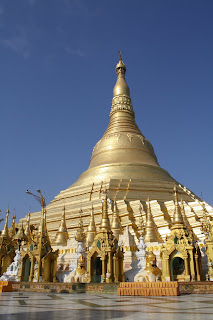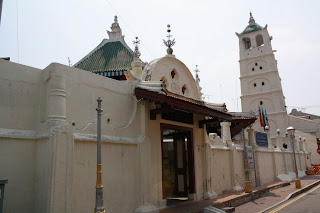
As the plane made its descent into Yangoon International Airport, I saw that the earth below had been sectioned off into perfect rectangles, similar to those in Viet Nam and Thailand-however, unlike the vibrant lush green rectangular rice paddies of its neighbors in Southeast Asia, these were brown and dry. Some days later, I learned that it was coming to the end of the dry season in Myanmar, and my arrival coincided with the entire was preparing for the monsoon rains to come. When thinking of Myanmar, or Burma, as the country is more commonly known, thoughts of crimson cloaked monks effortlessly floating pass golden gilded stupas comes to my mind. The country evokes images of old an Asia-a one where rickshaws still outnumber automobiles, where men still prefer the traditional longyi sarong over western pants; a country where children still bathe in the Irrawaddy river, and people still get up at the break of dawn to walk pass colonial-era buildings towards temples to offer morning prayers. Burma, in my mind, it is a mystical place, a Shangri-La of sorts. On the contrary, Burma's evil twin, Myanmar evokes thoughts an Orwellian state combining both
1984 and
Animal Farm --of human rights abuses, a military dictator government which refused international help in the aftermath of Cyclone Nagris in 2007; images of Aung Sang Suu Kyi, the rightful democratically elected leader under house arrest, and thousands of Buddhist Monks marching down the wide boulevards of Yangoon, soaked by monsoon rains, demanding a return of democracy and freedom. I ask myself, how can one country, one nation, evoke such drastically different responses? Human rights abuses in Shangri-La? Surely one of these images is not exactly as I understand it.

My first three days in Yangoon, the former capital of Myanmar (Burma) were a complete shock. I expected to fly into a dilapitated airport welcomed by soilders carrying rifles. What I got instead was an ultramodern big airport, smiling immigration officers with cheerful greetings, and an Arrivals Hall high in emotions of families and friends reuniting. For my ride into central Yangoon, I expected a quite and fast journey, passing wide tree-lined boulevards, colonial buildings, and people, sparsely spread out, going about their daily activities. Instead, 10 minutes into the journey, the driver instructed to roll up my windows and that he was going to turn on the air-conditioning. Having previous experience with the term, "air-conditioning" in developing countries to mean nothing else but warm air blowing through the vents, I politely told the driver it was okay and I did not need the air-con. He remain firm and insisted that I roll up my windows. I obliged, rolled up my windows and sat back, preparing myself for the sweating about to begin. Five minutes later, it became clear why the windows
needed be be rolled up. The day that I landed was the start of
Thingyan, or the Water Festival, which is 3 days before the Burmese New Year. As the end of the dry season is marked by the beginnings of the monsoon rains settling the dust, washing the earth clean and re-vitalizing the land,
Thingyan welcomes the Burmese new year by "washing" everyone of their sins and impurities to become clean for a fresh start in the new year. Traditionally, this "washing" was done by sprinkling people with perfumed water. Nowadays, during
Thingyan, the streets are lined on both sides with people and high-powered hoses, blasting jets of water at passerbys and automobiles. Pick-up trucks packed with young adults, dressed in black with blue, green, purple, red hair made their way into the jets of water, soaking these partiers from head to toe as they dance to the beats of Lady Gaga, Bon Jovi, Brittney Spears. Where am I? This is neither the Shangri-La or the Orwellian State that I was expecting. Rather, it was a scene directly out of Madri Gras in New Orleans, Carnival in Rio or Fantasy Fest in Key West. I was beyond shocked as I watched, with my windows rolled up, as my taxi weaved in and out of the traffic.


My preconceptions about Myanmar (Burma) were blown out of the water within the first three hours. I have to cast aside my fabricated images of this country and start from a blank surface. Journey with me to this land as I spend 14 days, traveling through it on buses, trains and boats. I have conversations with a business man, a Buddhist Monk, and a Burmese Indian, in an attempt to see and understand
their Myanmar (Burma).
 Since landing in Vietnam, I have been on the look out for that quintessential "Vietnamese Experience," one of those heart warming, soul tugging, old-woman-taking-me-by-the-hand-and-navigating-me-across-Hanoi-motorbike-traffic-welcome-to-Vietnam experience, or, getting-splashed-by-an-SUV-while-on-a-motorbike-caught-in-a-tropical-heavy-downpour-o-m-g-why-did-I-leave-the-US experience.
Since landing in Vietnam, I have been on the look out for that quintessential "Vietnamese Experience," one of those heart warming, soul tugging, old-woman-taking-me-by-the-hand-and-navigating-me-across-Hanoi-motorbike-traffic-welcome-to-Vietnam experience, or, getting-splashed-by-an-SUV-while-on-a-motorbike-caught-in-a-tropical-heavy-downpour-o-m-g-why-did-I-leave-the-US experience.









